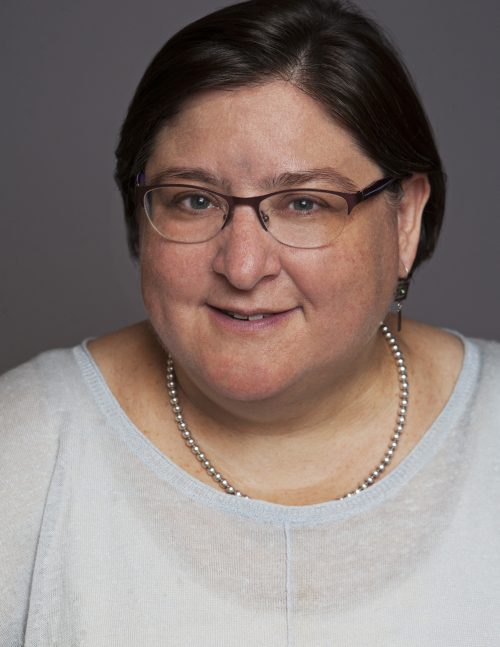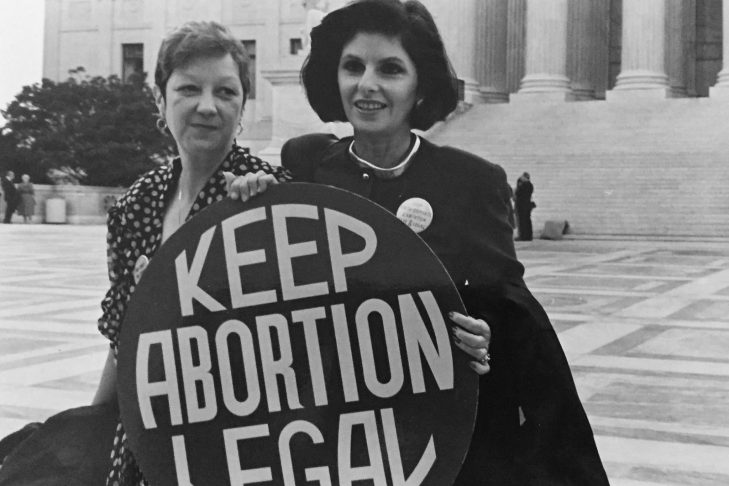This week marks 45 years since Roe v. Wade. But how far have we really come when dealing with abortion?
Hara Person from the Central Conference of American Rabbis has written eloquently about the Trump administration’s stance on abortion and the Affordable Care Act as it relates to contraception, as well as on the political agenda for Jewish women in 2018. What does it mean to be a woman in these turbulent times, during the #MeToo movement and with the right to contraception under attack? How can we speak out, act with courage and conviction and fight for justice, especially as parents? JewishBoston spoke to Person, whose own great-grandmother had to give herself abortions with knitting needles, about her hopes and advice for the future.
This is a confusing time to raise children. Any advice?
My kids are grown, and all throughout their lives, feminism, equality and raising men who treat women as equals has been a signature piece of my parenting, to the point that my kids tease me about it in a positive way. My son is 23 has been tweeting a lot about this issue and about his generation of men needing to step up to the plate and change things for the future.
There’s no magic formula. I guess a lot of topics have always been open and on the table in our home. That’s part of it, what you talk about. From a young age, I taught both of my kids that when a girl says no, it means no. I used to say it randomly, before it was at all relevant. I went to college in the 1980s. This was a time when date rape was just becoming a term that people were using and talking about. Then I went into an all-male profession. It shaped my view as women as change-makers and to have a seat at the table. All of that fed my parenting style.

But when I worked on “The Torah: A Women’s Commentary,” I put my heart and soul into it. It was an amazing experience in terms of raising up women’s voices, digging up whatever little traces we could find about women’s lives in biblical times. It was a life-changing experience to work on it, and it had a significant impact. My kids were hearing about it all the time. “What does it mean that this Torah commentary is just by women? Why is it a big deal? What difference does it make if written by a man or a woman?” This was our dinner-table conversation. On a Friday, the day before my son became a bar mitzvah, and it wasn’t even released yet, I got an advance copy that the printer sent to me. I made this big moment during the services that Shabbat morning presenting it to him. I said, “You are the first one to receive this groundbreaking book.” I was close to tears. The editors were in the congregation. It was so moving to us. Afterward, my son said, “Mom, you giving me this in front of my friends was like handing me a tampon.” It was a great moment of realizing that what might be significant to me isn’t their story.
How do we become engaged in current events, like #MeToo, without becoming desensitized, especially if we’re not directly affected?
The telling of stories is so important, taking things out of the shadows. That begins to de-normalize things. “Wait a second, because it’s always been this way doesn’t mean it’s right. Just because one group says it should be this way doesn’t make it right.” We have the ability to speak up and question and to push against barriers, and I think the private stage is as important as a public stage. How do we speak to people? How do we allow them to speak to us? What is OK? What is acceptable? It’s calling people on stuff: “Wait a second, the joke you just told is offensive, and here’s why.”
It’s teaching women not to be afraid of consequences and not to be afraid to speak up. The flip side is to teach men what the boundaries are and what might be hurtful, even if you don’t mean it. In the public realm, I was just reading about this absurd scenario in which women reporters had to stand behind their male colleagues in Israel. It was outrageous. How do we say that’s normal? How do we say that the far-right interpretation of Judaism is acceptable? For too many years, we’ve ceded ground in that area. We’ve said OK, to each his own. But it’s harmful for kids, for who we are. That kind of discriminatory behavior isn’t who we are and who we’ve been historically.
How do we speak up when there still are consequences, and scary ones?
We’ve always had to weigh the consequences and make the choices that aren’t necessarily the best choices personally but maybe the best professionally. That’s the whole Harvey Weinstein thing, the things you put up with because it gets you somewhere. But with the emerging of so many of these stories, I think we’re really approaching a point in which the consequences have shifted. It’s understood that behaving a certain way is not OK, and it’s on [the perpetrator] if it’s how they’re going to behave. The people who do it are facing consequences. That’s what’s interesting about this moment: Are we at a tipping point? I know my daughter is more comfortable calling out certain behaviors than I was at her age. I didn’t have that at her age. I had to learn assertiveness in a way that she was born into. She’s better equipped to articulate what a problem is and why it is.
What was different about the era in which you and your daughter were raised?
It was always important for me not to raise a “good girl.” In my generation, a good girl didn’t speak out; she put up with certain things, smiled, apologized, tried to make things OK for people around her, didn’t ruffle feathers. I raised an outspoken woman. Part of it is allowing girls all the opportunities one would allow a boy, not expecting girls to be compliant, not expecting girls to fit in, smile, be happy. Allow the risk-taking that you would allow the boy. Allow questioning and challenging, even when it’s uncomfortable.
How can we get involved in social justice issues, especially abortion rights?
By speaking out, writing and calling. But I think it fits into the bigger part of our narrative as women. How many of us would not be where we are today in terms of the opportunities we have and the things we get to do in the world if access hadn’t been available? Think of the lives of our grandmothers and great-grandmothers, dealing with big families, poverty and the inability to rise out of poverty.
And we know how many women did die [from illegal abortion or from childbirth]. We know what it does to families. Jewishly, it’s a justice issue. If we’re all equal, and I believe Judaism does teach that, it becomes a basic justice issue. If we’re all equal, we all have the same ability to have agency and self-determination; abortion is a big piece of that for women.
We all know people who have had tragic pregnancies, fetuses not viable, the horror of carrying to term, I could go on for hours. There is something very cruel and punishing about the ongoing limitation on women’s reproductive rights. … For men to want to control that, to me it touches on a basic issue of justice within a Jewish community.
So it’s all about women’s ability to determine their own course and coming together to support each other, to fight against politicians taking away our agency and our rights.
What do you hope for the future?
I’d like to see politicians in power who actually, honestly care about women’s rights, abortion among them. Women’s health care is an issue of justice, and it would be nice if we could turn the House. I do hope we’re raising the next generation who will fight for these rights.



